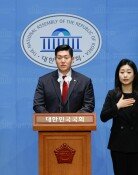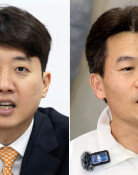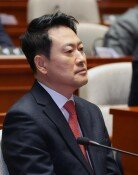[Editorial] Anti-U.S. Policy Has Price
[Editorial] Anti-U.S. Policy Has Price
Posted July. 15, 2006 06:22,
The day before yesterday, the North Korean delegates headed back to North Korea after rupturing the South-North cabinet-level meeting, harshly swearing, Youll pay for this. They finally spoke out what they had in mind through the same mouth with which they had called out between our one-nationed brotherhood, seeing that they could not easily obtain the 500,000 tons of rice and raw materials for the light industries that they asked for as though theyd given those goods into our keeping. The responses to the national cooperation slogan that the Roh Moo-hyun regime and the pro-North left wing groups have been crying out, waving the flag of de-Americanization and anti-U.S are slander and insults. Does this mean the devotion for the Kim Jong Il regime was not sufficient?
The Kim Dae-jung regime and the succeeding Roh regime have spent national taxes of 3.2333 trillion won on aiding North Korea, calling the money peace expenses for the last six years. Support to the North given through private routes is not ignorable, either. But the result of that was the 60 billion won missile exhibition. U.S. Armed Forces Commander in Korea, Burwell B. Bell, stated yesterday, Nodong and Scud missiles were aimed at South Korea. But the head of the Unification, Foreign Affairs and Trade Committee, Kim Won-ung, also a member of the ruling party, driveled, North Korea said it was a self-defense measure. The U.S. is overreacting. Is the Seoul, the deluge of flames theory North Korea habitually mentions also for self-defense?
The goal of the pro-North left wing groups who declared last year as the year of the withdrawal of the U.S. Army is being materialized smoothly. Regarding the aim of the Roh regime to regain control over wartime strategy by 2012, Commander Bell has said, We are reviewing a scheme to break down the ROK-U.S. Combined Forces Command in which case the two countries will each build up independent command offices. But pushing for the redemption of wartime control under the name of autonomy, when we lack the capability to carry out independent inspection of information, exposes South Koreans to the military threats of North Korea even more seriously than now. This is just what the Kim Jong Il regime and the pro-North left wing groups in South Korea target at.
Moreover, the autonomy expenses required for anti-U.S. and de-Americanization are astronomical. The Roh regime has brought about an account bill of 151 trillion won as the military budget for 2007-2011, which cries out for an independent self-defense, something that even the superpower U.S. is incapable of. According to this plan, we would have to raise the military budget of 22.5 trillion won this year by 9.9 percent each year. It would cost South Koreans 1.5 trillion won for four early warning aircrafts and three trillion won for three Aegis ships, costs that would be unnecessary if the Korea-U.S. alliance were strong enough.
And now the U.S is unwilling to sell us the extreme-altitude unmanned inspection craft, Global Hawk. This craft is compulsory to us if we are to obtain the capability for high-tech data collection, 90 percent of which activity we depend on the U.S. Who can call the Korea-U.S. relationship an alliance when one of the reasons the U.S. is unwilling to sell the craft is because the U.S. fears that the data collected might flow into North Korea if South Korea possessed a Global Hawk. The U.S. and Japan had already predicted the missile launch by North Korea a month ago and have since been discussing the resolutions for sanctioning North Korea, of which South Korea was blindly left out. We now know that Deputy Minister of Foreign Affairs of Japan Shotaro meant it when he said, Its difficult to collaborate with South Korea in data collection as South Korea is not trustworthy.
The economic blows are being realized, too. The price of the depository receipt of Korea Electronic Power Corporation (KEPCO) listed in the New York Stock Exchange dropped by 6.2 percent after the North Korean missile launch, and a possibility of a downfall in its international credibility standing is also conceivable. The National Intelligence Service diagnosed the day before yesterday that the economic blow will only grow bigger if the missile crisis turns into a long-term phase. The credit rating agency, Moodys Investors Service, degraded South Korea by two grades from A3 positive to A3 negative in 2003 when the second North Korean nuclear crisis broke out. A downfall in the international credibility standing results in a hike in interest rates of raising foreign funds and a leak-out of invested foreign funds. Who on earth would feel like investing in a country where the foreign residents often complain, Im afraid to go out because of the anti-U.S. demonstrations.
The Roh regime does not yet show any signs of awakening from the fantasy of between our one-nationed brotherhood and autonomy even though the account bills of security and economy pile up on both sides. A regime is short-lived, but the nation has to go on. This regime can leave its seat after propelling towards whatever suits its mood, but for what misdeeds will the people of the nation have to bear the debts, one generation after another? Its high time that the majority of the people stand up against the anti-U.S., de-Americanization sentiments.







